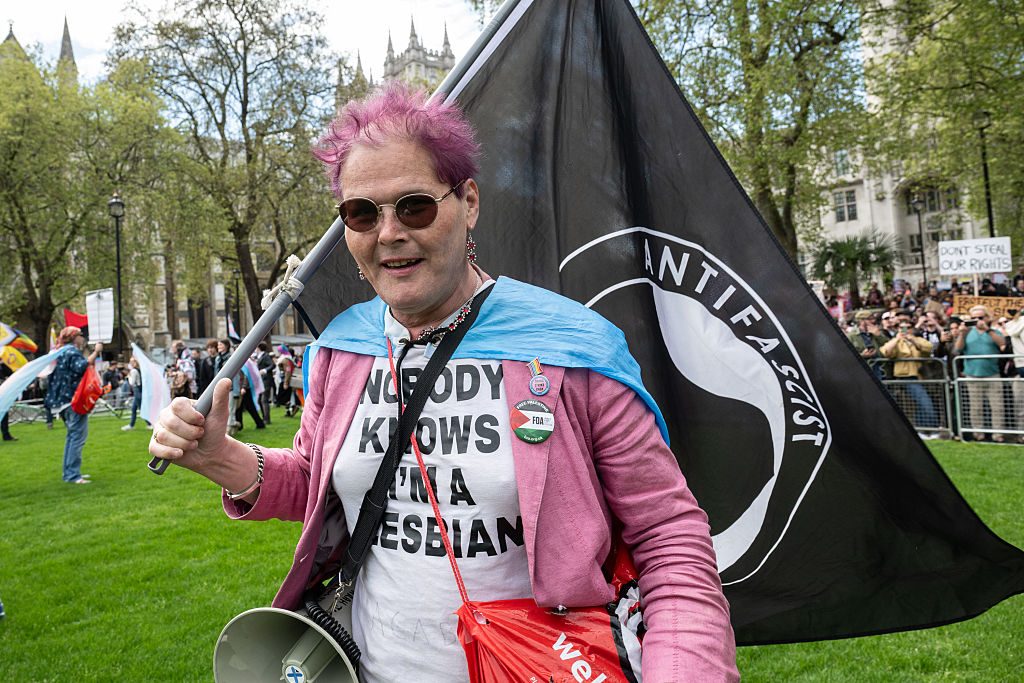Life isn’t easy for trans activists: despite enjoying the same legal rights as every other citizen, many still frame their cause in the language of oppression. To their credit, it takes a certain boldness to claim victimhood while threatening others. Yet that’s precisely what played out at Saturday’s 100,000-strong “trans rights” march in London.
Placards demanding free hormones, legal recognition for non-binary identities, and — most chillingly — to “Arm trans people” were spotted at the march. Photos of feminists such as J.K. Rowling, Susan Smith, and Marion Calder were also on display, crudely labelled “Bitch trolls from hell.”
Among those leading the charge was Sarah Jane — né Alan — Baker, Britain’s “longest-serving trans prisoner”. With “Free Gaza” daubed across his chest, the ex-convict led chants through a megaphone. Baker was convicted of kidnap and torture, and during his incarceration he was also found guilty of attempted murder of a fellow inmate. He also found time while in prison to castrate himself. In 2023, he urged a crowd to “punch terfs in the face” and has since gained recognition for organising trans rights rallies.
Trans activism has always attracted bullies. I received my first threat nearly a decade ago — and since then, women’s rights campaigners I know have faced stalking, assault, bomb threats, and legal harassment for trying to organise meetings. Others have been pushed out of jobs or dragged through the courts.
For years, this behaviour was ignored by politicians, while Stonewall, celebrities and HR departments lent a sheen of legitimacy to demands that were unhinged from the start.
But the shine has now worn off. Thanks to a resurgent women’s movement and the Supreme Court’s ruling affirming that sex means biology, the trans lobby has been dragged into the daylight. It’s come as a shock to activists who, just a few years ago, were on the brink of rewriting the law.
Organisers of Saturday’s march claimed it was to celebrate “existence and resistance”. Peddling a well-worn narrative of persecution, Trans Pride founder Lewis G. Burton railed against the court ruling, declaring: “You can try to take away our rights, but you will never remove us from society. We are a part of humanity — and the public will not stand by while harm is done to our community.”
Let’s be clear: no one is denying that trans-identified people are human, or that they deserve the same rights as everyone else. What’s being resisted is not their existence, but their attempt to restructure society around their feelings.
There was no mandate for this movement’s demands. Changes to law and policy were pushed through by stealth, with lobby groups co-opting employers through training sessions and model policies. But when the public caught on, they said no. And for those used to getting their way, “no” is frighteningly unfamiliar.
The Government should have listened to those who first sounded the alarm. Feminists — many of whom recognise the tactics used by abusers — warned that this was never about kindness. It was always about coercion. Now, with “Arm trans people” as a rallying cry, the direction of travel is obvious. The placards at Trans+ Pride weren’t a glitch. They were a sign of things to come.











Join the discussion
Join like minded readers that support our journalism by becoming a paid subscriber
To join the discussion in the comments, become a paid subscriber.
Join like minded readers that support our journalism, read unlimited articles and enjoy other subscriber-only benefits.
Subscribe